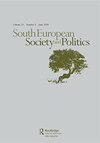轻轻地杀死竞争性威权主义:2019年土耳其地方选举
IF 4.6
1区 社会学
Q1 POLITICAL SCIENCE
引用次数: 53
摘要
2019年3月31日,土耳其选民结束了25年来伊斯兰主义者在该国最大城市的地方治理,并使执政的正义与发展党(AKP)遭受了自2002年上台以来最严重的选举失败。本文探讨主要政党在地方选举中的选举策略,对选举结果进行比较分析,并讨论选举后的发展,包括伊斯坦布尔的重新选举。选举及其后果再次确认了该政权的竞争性独裁性质,因为执政集团享有不公平的竞争环境,而反对派必须达到比现任者更高的选举门槛才能获胜。经济危机、对政府政策日益增长的不满以及反对党的有效协调促成了这一结果。本文章由计算机程序翻译,如有差异,请以英文原文为准。
Killing Competitive Authoritarianism Softly: The 2019 Local Elections in Turkey
ABSTRACT On 31 March 2019 Turkish voters ended the Islamist local governance in the country’s largest cities after 25 years and handed the ruling AKP its most serious electoral defeat since its rise to power in 2002. The article explores the electoral strategies of major parties in the local election, offers a comparative analysis of the results, and discusses post-election developments, including the rerun in Istanbul. The election and its aftermath reaffirmed the competitive authoritarian nature of the regime, as the governing bloc enjoyed an uneven playing field, while the opposition had to meet a higher electoral bar than the incumbents to win. The economic crisis, growing discontent with the government’s policies, and effective coordination of opposition parties facilitated this outcome.
求助全文
通过发布文献求助,成功后即可免费获取论文全文。
去求助
来源期刊

South European Society and Politics
Multiple-
CiteScore
5.80
自引率
21.20%
发文量
14
期刊介绍:
A leading point of reference for scholars of Southern Europe, South European Society and Politics promotes both comparative and inter-disciplinary analyses, as well as offering innovative single county and sub-national studies. The journal acts as a forum for social, economic, cultural, contemporary historical and political approaches to research on the region, and is particularly keen to sponsor policy–focused studies in all these disciplines. The journal publishes research articles; South European Atlas with election reports and articles on other subjects of topical interest, and an extensive book reviews section, including both review articles and individual book reviews.
 求助内容:
求助内容: 应助结果提醒方式:
应助结果提醒方式:


